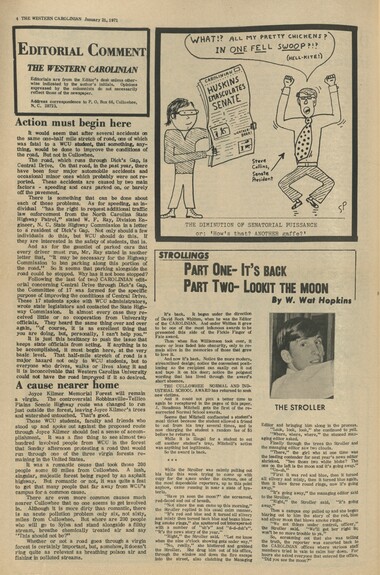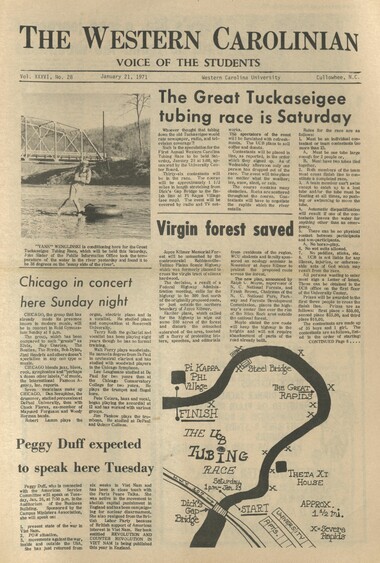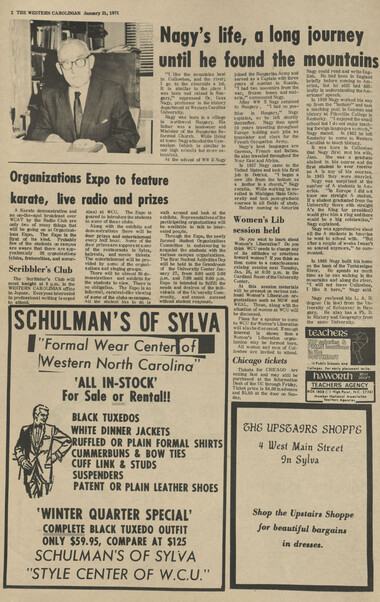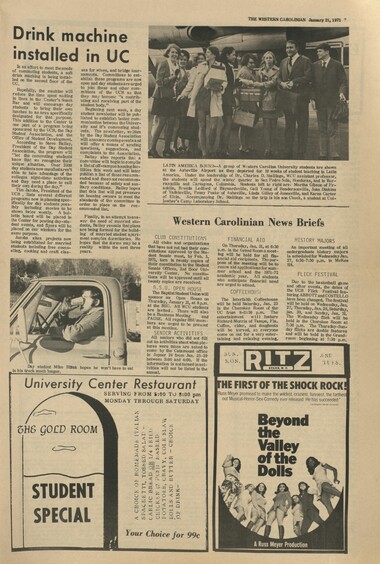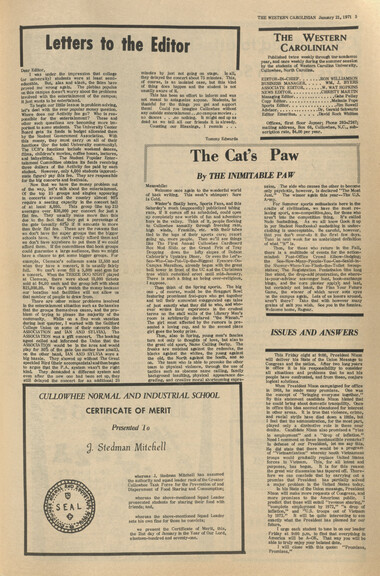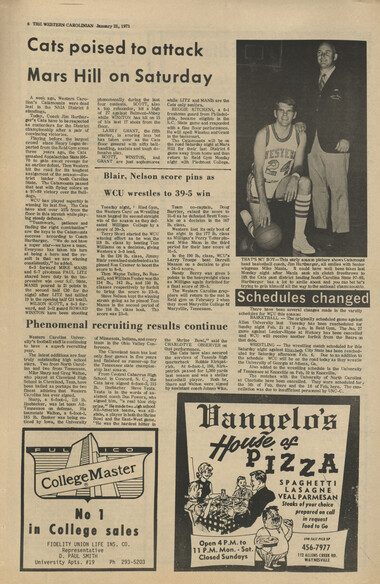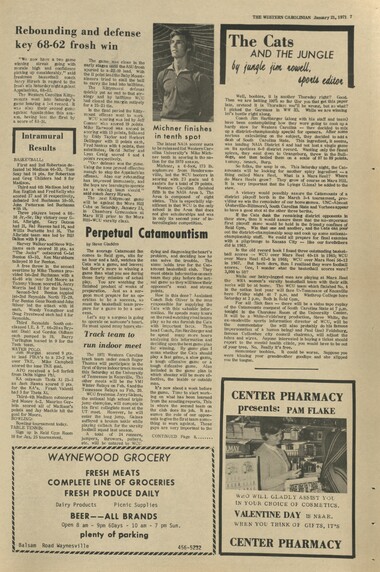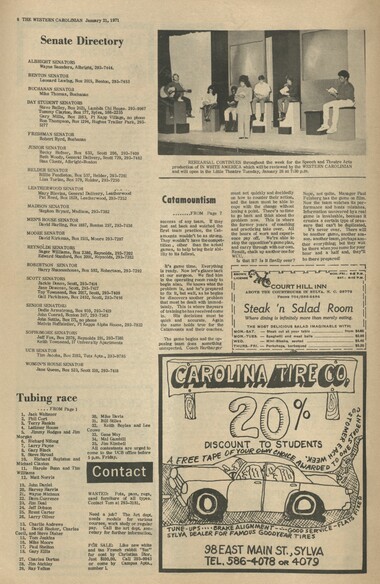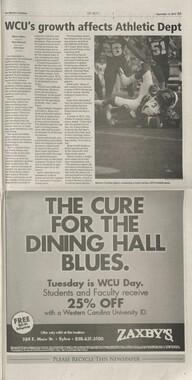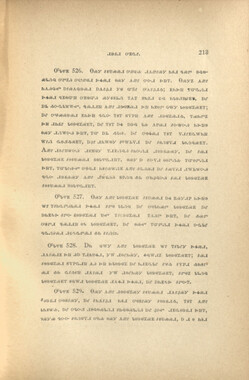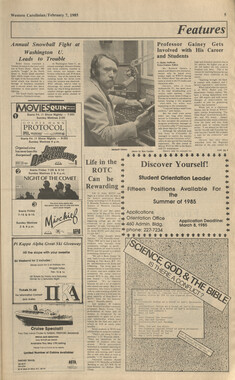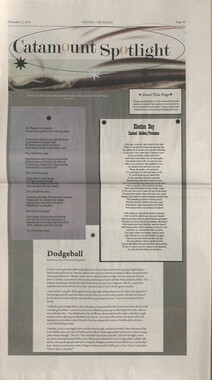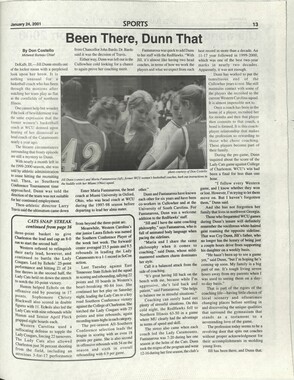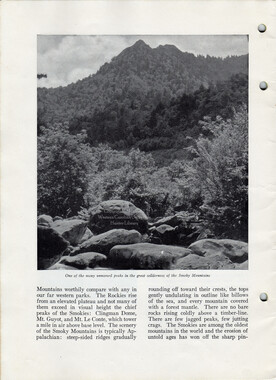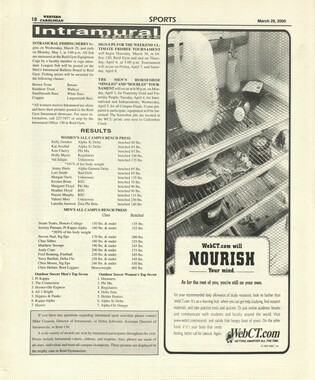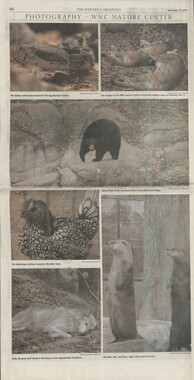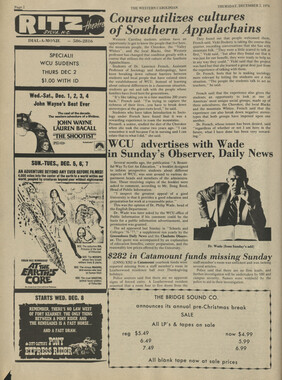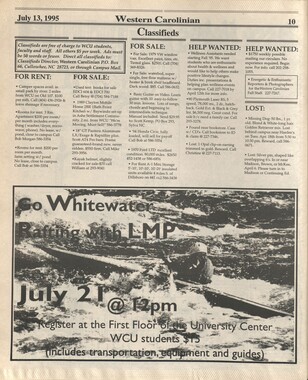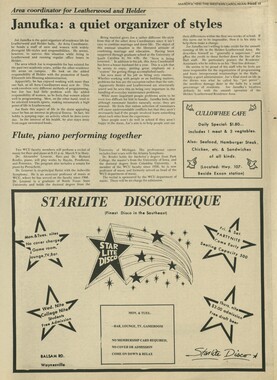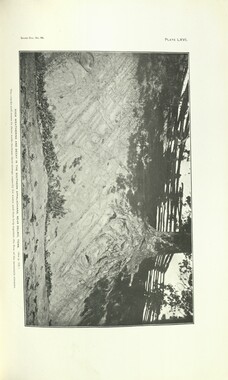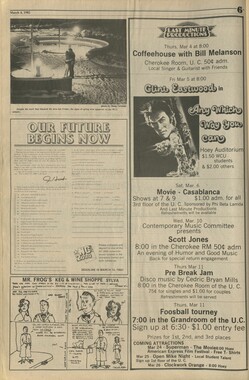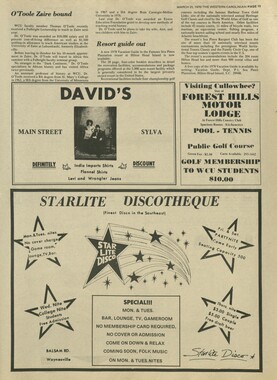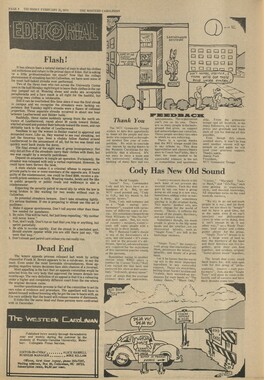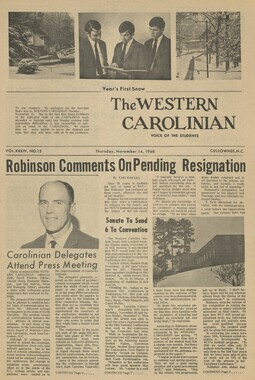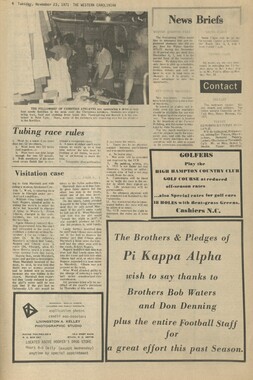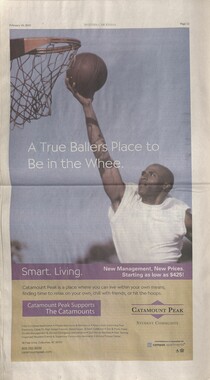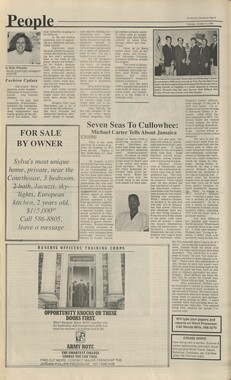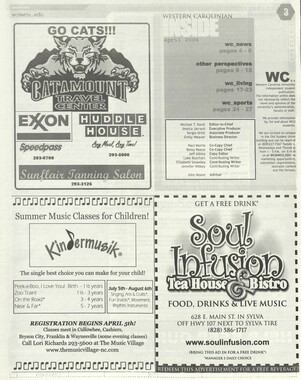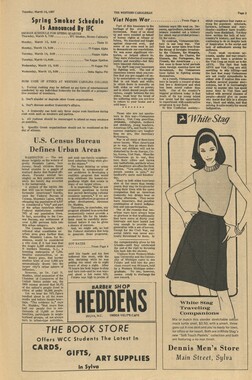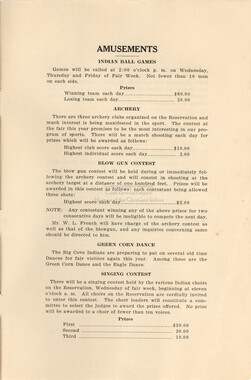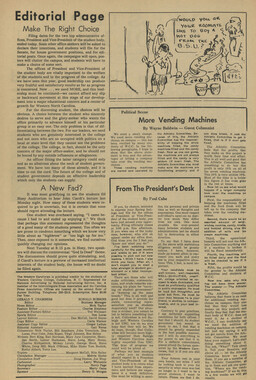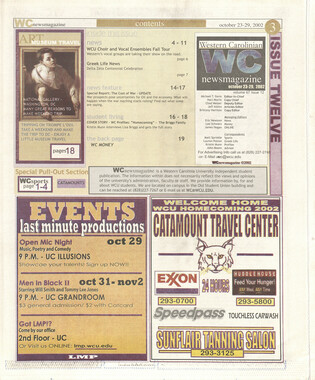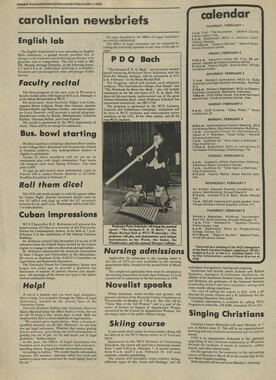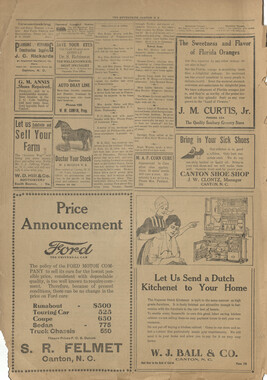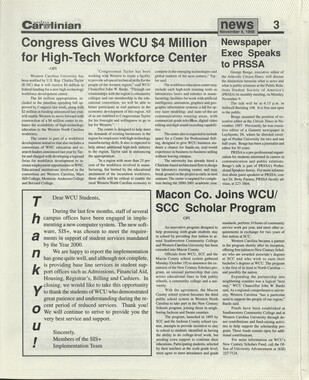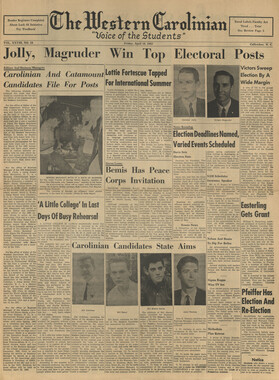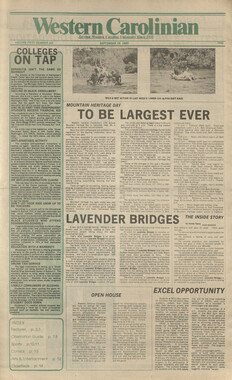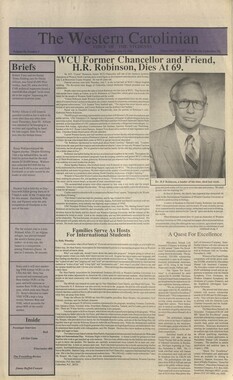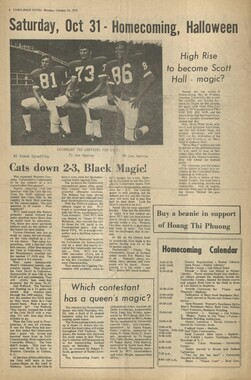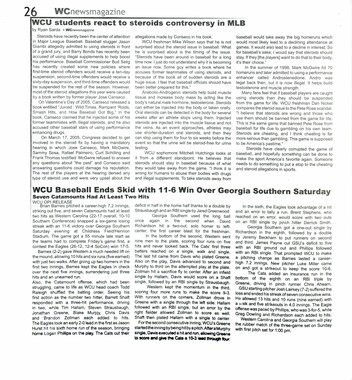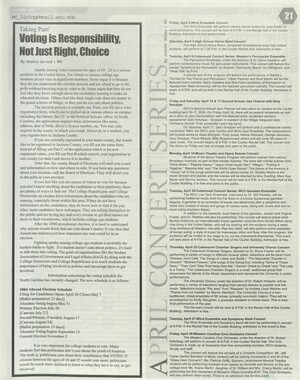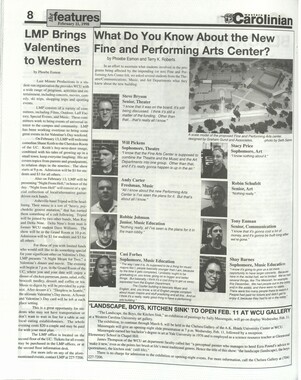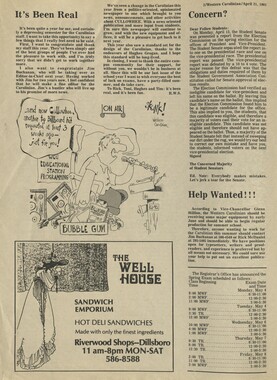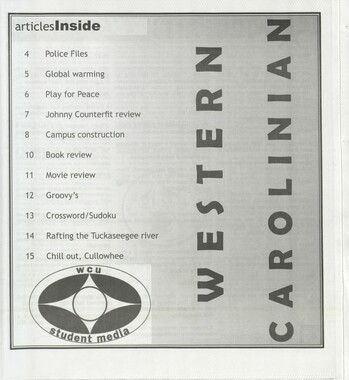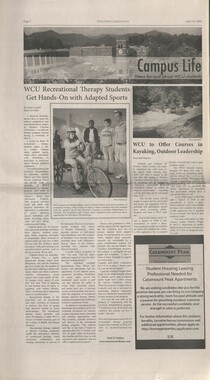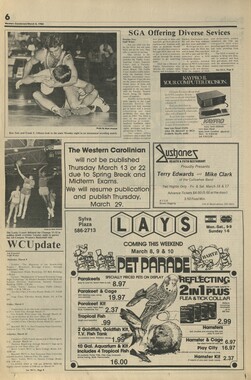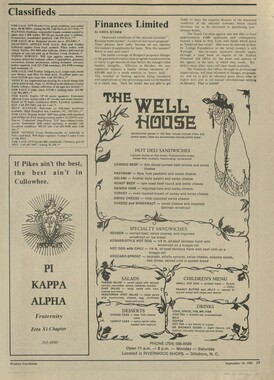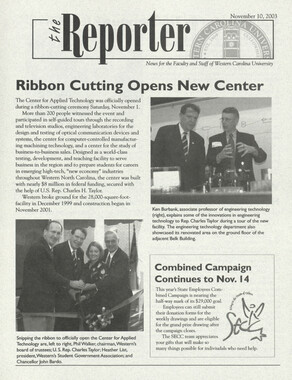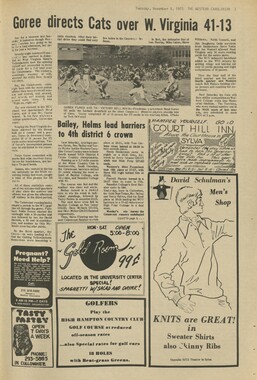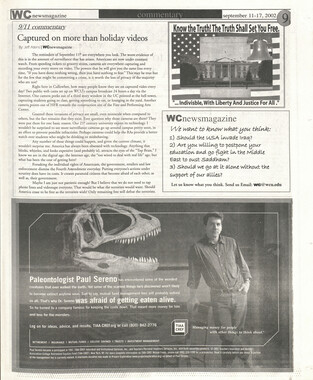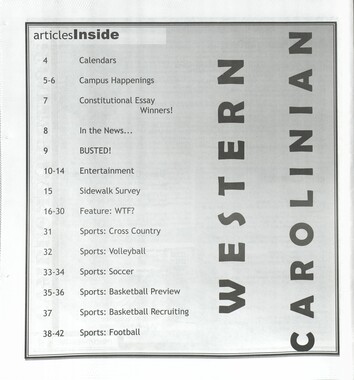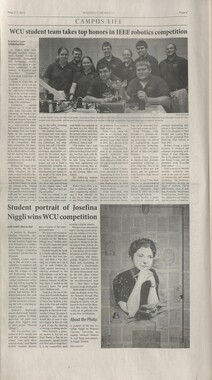Western Carolina University (21)
View all
- Canton Champion Fibre Company (2308)
- Cherokee Traditions (291)
- Civil War in Southern Appalachia (165)
- Craft Revival (1942)
- George Masa Collection (137)
- Great Smoky Mountains - A Park for America (2900)
- Highlights from Western Carolina University (422)
- Horace Kephart (973)
- Journeys Through Jackson (159)
- LGBTQIA+ Archive of Jackson County (85)
- Oral Histories of Western North Carolina (316)
- Picturing Appalachia (6797)
- Stories of Mountain Folk (413)
- Travel Western North Carolina (153)
- Western Carolina University Fine Art Museum Vitreograph Collection (129)
- Western Carolina University Herbarium (92)
- Western Carolina University: Making Memories (738)
- Western Carolina University Publications (2491)
- Western Carolina University Restricted Electronic Theses and Dissertations (146)
- Western North Carolina Regional Maps (71)
- World War II in Southern Appalachia (131)
University of North Carolina Asheville (6)
View all
- Allanstand Cottage Industries (62)
- Appalachian National Park Association (53)
- Bennett, Kelly, 1890-1974 (1463)
- Berry, Walter (76)
- Brasstown Carvers (40)
- Carver, George Washington, 1864?-1943 (26)
- Cathey, Joseph, 1803-1874 (1)
- Champion Fibre Company (233)
- Champion Paper and Fibre Company (297)
- Cherokee Indian Fair Association (16)
- Cherokee Language Program (22)
- Crowe, Amanda (40)
- Edmonston, Thomas Benton, 1842-1907 (7)
- Ensley, A. L. (Abraham Lincoln), 1865-1948 (275)
- Fromer, Irving Rhodes, 1913-1994 (70)
- George Butz (BFS 1907) (46)
- Goodrich, Frances Louisa (120)
- Grant, George Alexander, 1891-1964 (96)
- Heard, Marian Gladys (60)
- Kephart, Calvin, 1883-1969 (15)
- Kephart, Horace, 1862-1931 (313)
- Kephart, Laura, 1862-1954 (67)
- Laney, Gideon Thomas, 1889-1976 (439)
- Masa, George, 1881-1933 (61)
- McElhinney, William Julian, 1896-1953 (44)
- Niggli, Josephina, 1910-1983 (10)
- North Carolina Park Commission (105)
- Osborne, Kezia Stradley (9)
- Owens, Samuel Robert, 1918-1995 (11)
- Penland Weavers and Potters (36)
- Roberts, Vivienne (15)
- Roth, Albert, 1890-1974 (142)
- Schenck, Carl Alwin, 1868-1955 (1)
- Sherrill's Photography Studio (2565)
- Southern Highland Handicraft Guild (127)
- Southern Highlanders, Inc. (71)
- Stalcup, Jesse Bryson (46)
- Stearns, I. K. (213)
- Thompson, James Edward, 1880-1976 (226)
- United States. Indian Arts and Crafts Board (130)
- USFS (683)
- Vance, Zebulon Baird, 1830-1894 (1)
- Weaver, Zebulon, 1872-1948 (58)
- Western Carolina College (230)
- Western Carolina Teachers College (282)
- Western Carolina University (2008)
- Western Carolina University. Mountain Heritage Center (18)
- Whitman, Walt, 1819-1892 (10)
- Wilburn, Hiram Coleman, 1880-1967 (73)
- Williams, Isadora (3)
- Cain, Doreyl Ammons (0)
- Crittenden, Lorraine (0)
- Rhodes, Judy (0)
- Smith, Edward Clark (0)
- Appalachian Region, Southern (2940)
- Asheville (N.C.) (1944)
- Avery County (N.C.) (26)
- Blount County (Tenn.) (195)
- Buncombe County (N.C.) (1680)
- Cherokee County (N.C.) (283)
- Clay County (N.C.) (556)
- Graham County (N.C.) (238)
- Great Smoky Mountains National Park (N.C. and Tenn.) (525)
- Haywood County (N.C.) (3573)
- Henderson County (N.C.) (70)
- Jackson County (N.C.) (4919)
- Knox County (Tenn.) (35)
- Knoxville (Tenn.) (13)
- Lake Santeetlah (N.C.) (10)
- Macon County (N.C.) (421)
- Madison County (N.C.) (216)
- McDowell County (N.C.) (39)
- Mitchell County (N.C.) (135)
- Polk County (N.C.) (35)
- Qualla Boundary (982)
- Rutherford County (N.C.) (78)
- Swain County (N.C.) (2185)
- Transylvania County (N.C.) (270)
- Watauga County (N.C.) (12)
- Waynesville (N.C.) (86)
- Yancey County (N.C.) (72)
- Aerial Photographs (3)
- Aerial Views (60)
- Albums (books) (4)
- Articles (1)
- Artifacts (object Genre) (228)
- Bibliographies (1)
- Biography (general Genre) (2)
- Cards (information Artifacts) (38)
- Clippings (information Artifacts) (192)
- Copybooks (instructional Materials) (3)
- Crafts (art Genres) (622)
- Depictions (visual Works) (21)
- Design Drawings (1)
- Digital Moving Image Formats (2)
- Drawings (visual Works) (185)
- Envelopes (101)
- Exhibitions (events) (1)
- Facsimiles (reproductions) (1)
- Fiction (general Genre) (4)
- Financial Records (12)
- Fliers (printed Matter) (67)
- Glass Plate Negatives (381)
- Guidebooks (2)
- Internegatives (10)
- Interviews (817)
- Land Surveys (102)
- Letters (correspondence) (1045)
- Manuscripts (documents) (618)
- Maps (documents) (177)
- Memorandums (25)
- Minutes (administrative Records) (59)
- Negatives (photographs) (6090)
- Newsletters (1290)
- Newspapers (2)
- Notebooks (8)
- Occupation Currency (1)
- Paintings (visual Works) (1)
- Pen And Ink Drawings (1)
- Periodicals (193)
- Personal Narratives (10)
- Photographs (12976)
- Plans (maps) (1)
- Poetry (6)
- Portraits (4568)
- Postcards (329)
- Programs (documents) (181)
- Publications (documents) (2444)
- Questionnaires (65)
- Relief Prints (26)
- Sayings (literary Genre) (1)
- Scrapbooks (282)
- Sheet Music (2)
- Slides (photographs) (402)
- Songs (musical Compositions) (2)
- Sound Recordings (796)
- Specimens (92)
- Speeches (documents) (18)
- Tintypes (photographs) (8)
- Transcripts (324)
- Text Messages (0)
- A.L. Ensley Collection (275)
- Appalachian Industrial School Records (7)
- Appalachian National Park Association Records (336)
- Axley-Meroney Collection (2)
- Bayard Wootten Photograph Collection (20)
- Bethel Rural Community Organization Collection (7)
- Blumer Collection (5)
- C.W. Slagle Collection (20)
- Canton Area Historical Museum (2110)
- Carlos C. Campbell Collection (462)
- Cataloochee History Project (64)
- Cherokee Studies Collection (4)
- Daisy Dame Photograph Album (5)
- Daniel Boone VI Collection (1)
- Doris Ulmann Photograph Collection (112)
- Elizabeth H. Lasley Collection (1)
- Elizabeth Woolworth Szold Fleharty Collection (4)
- Frank Fry Collection (95)
- George Masa Collection (173)
- Gideon Laney Collection (452)
- Hazel Scarborough Collection (2)
- Hiram C. Wilburn Papers (28)
- Historic Photographs Collection (236)
- Horace Kephart Collection (861)
- Humbard Collection (33)
- Hunter and Weaver Families Collection (1)
- I. D. Blumenthal Collection (4)
- Isadora Williams Collection (4)
- Jesse Bryson Stalcup Collection (47)
- Jim Thompson Collection (224)
- John B. Battle Collection (7)
- John C. Campbell Folk School Records (80)
- John Parris Collection (6)
- Judaculla Rock project (2)
- Kelly Bennett Collection (1482)
- Love Family Papers (11)
- Major Wiley Parris Civil War Letters (3)
- Map Collection (12)
- McFee-Misemer Civil War Letters (34)
- Mountain Heritage Center Collection (4)
- Norburn - Robertson - Thomson Families Collection (44)
- Pauline Hood Collection (7)
- Pre-Guild Collection (2)
- Qualla Arts and Crafts Mutual Collection (12)
- R.A. Romanes Collection (681)
- Rosser H. Taylor Collection (1)
- Samuel Robert Owens Collection (94)
- Sara Madison Collection (144)
- Sherrill Studio Photo Collection (2558)
- Smoky Mountains Hiking Club Collection (616)
- Stories of Mountain Folk - Radio Programs (374)
- The Reporter, Western Carolina University (510)
- Venoy and Elizabeth Reed Collection (16)
- WCU Gender and Sexuality Oral History Project (32)
- WCU Mountain Heritage Center Oral Histories (25)
- WCU Oral History Collection - Mountain People, Mountain Lives (71)
- WCU Students Newspapers Collection (1923)
- Western North Carolina Tomorrow Black Oral History Project (69)
- William Williams Stringfield Collection (2)
- Zebulon Weaver Collection (109)
- African Americans (390)
- Appalachian Trail (35)
- Artisans (521)
- Cherokee art (84)
- Cherokee artists -- North Carolina (10)
- Cherokee language (21)
- Cherokee pottery (101)
- Cherokee women (208)
- Church buildings (190)
- Civilian Conservation Corps (U.S.) (111)
- College student newspapers and periodicals (2012)
- Dams (108)
- Dance (1023)
- Education (222)
- Floods (63)
- Folk music (1015)
- Forced removal, 1813-1903 (2)
- Forest conservation (220)
- Forests and forestry (1197)
- Gender nonconformity (4)
- Great Smoky Mountains National Park (N.C. and Tenn.) (181)
- Hunting (46)
- Landscape photography (25)
- Logging (119)
- Maps (83)
- Mines and mineral resources (9)
- North Carolina -- Maps (18)
- Paper industry (38)
- Postcards (255)
- Pottery (135)
- Railroad trains (72)
- Rural electrification -- North Carolina, Western (3)
- School integration -- Southern States (2)
- Segregation -- North Carolina, Western (5)
- Slavery (5)
- Sports (452)
- Storytelling (243)
- Waterfalls -- Great Smoky Mountains (N.C. and Tenn.) (66)
- Weaving -- Appalachian Region, Southern (280)
- Wood-carving -- Appalachian Region, Southern (328)
- World War, 1939-1945 (173)
Western Carolinian Volume 36 Number 28
Item
Item’s are ‘child’ level descriptions to ‘parent’ objects, (e.g. one page of a whole book).
-
-
4 THE WESTERN CAROLINIAN January 21,1971 Editorial Comment THE WESTERN CAROLINIAN Editorials are from the Editor's desk unless otherwise indicated by the author's initials. Opinions expressed by the columnists do not necessarUy reflect those of the newspaper. Address correspondence to P. O. Box 66, Cullowhee, N. C. 28723. Action must begin here It would seem that after several accidents on the same one-half mile stretch of road, one of which was fatal to a WCU student, that something, anything, would be done to improve the conditions of the road. But not in Cullowhee. The road, which runs through Dick's Gap, is Central Drive. On that road, in the past year, there have been four major automobile accidents and occasional minor ones which probably were not reported. These accidents are caused by two main factors - speeding and cars parked on, or barely off the pavement. There is something that can be done about each of these problems. As for speeding, an individual "has the right to request additional traffic law enforcement from the North Carolina State Highway Patrol," stated W. F. Ray, Division Engineer, N. C. State Highway Commission in a letter to a resident of Dick's Gap. Not only should a few individuals do this, but WCU should do this. If they are interested in the safety of students, that is. And as for the gauntlet of parked cars that every driver must run, Mr. Ray stated in another letter that, "It may be necessary for the Highway Commission to ban parking along this portion of the road." So it seems that parking alongside the road could be stopped. Why has it not been stopped? Following the last (of two) CAROLINIAN editorial concerning Central Drive through Dick's Gap, the Committee of 17 was formed for the specific purpose of improving the conditions of Central Drive. These 17 students spoke with WCU administrators, wrote state legislators and contacted the State Highway Commission. In almost every case they received little or no cooperation from University officials. They heard the same thing over and over again, "of course, it is an excellent thing that you are doing, but, personally, I cant help you." It is just this hesitancy to push the issue that keeps state officials from acting. If anything is to be accomplished, it must begin here, at the very basic level. That half-mile stretch of road is a major hazard not only to WCU students, but to everyone who drives, walks or lives along it and it is inconceivable that Western Carolina University could not have the road improved if it so desired. A cause nearer home Joyce Kilmer Memorial Forest will remain a virgin. The controversial Robbinsville-Tellico Plains Scenic Highway route was changed to run just outside the forest, leaving Joyce Kilmer's trees and watershed untouched. That's good. Those WCU students, faculty and friends who stood up and spoke out against the proposed route through Joyce Kilmer should feel a sense of accomplishment. It was a fine thing to see almost two hundred involved people from WCU in the forest that Sunday afternoon protesting a road that would run through one of the three virgin forests remaining in the United States. It was a romantic cause that took those 200 people some 60 miles from Cullowhee. A lush, singular, majestic forest being raped by an asphalt highway. But romantic or not, it was quite a feat to get that many people that far away from WCU's campus for a common cause. There are even more common causes much nearer Cullowhee that no one seems to get involved in. Although it is more dirty than romantic, there is an acute pollution problem only six, not sixty, miles from Cullowhee. But where are 200 people who will go to Sylva and stand alongside a filthy stream, breathe chemically treated air and say '•This should not be?" Whether or not a road goes through a virgin forest is certainly important, but, somehow, it doesn't ring quite as relevant as breatiiing poison air and fishing in polluted streams. STftOUINGS Part One- It's back Part Two- Lookit the moon By W. Wat Hopkins It's back. It began under the direction of David Rock Whitten, when he was the Editor of the CAROLINIAN. And under Whitten it grew to be one of the most infamous awards to be presented this side of the Fickle Finger of Fate award. Then when Ron Williamson took over, it more or less faded into obscurity, only to remain alive in the memories of those that grew to love it, And now it's back. Notice the more modern, streamlined design; notice the convenient positioning so the recipient can easily cut it out and tape it on his door; notice the poignant wording that has lived through the award's short absence. THE CULLOWHEE NORMAL AND INDUSTRIAL SCHOOL AWARD has returned to seek new victims. And it could not picK a better time to again be recaptured in the pages of this paper. J. Steadman Mitchell gets the first of the resurrected Normal School awards. Seems that Mitchell confiscated a student's meal ticket because the student allowed a friend to eat from his tray several times, and is now charging the student a random fee of $5 before he returns it, While it is illegal for a student to eat off another student's tray, Mitchell's action was anything but legitimate. So the award is back. While the Stroller was calmly pulling out his hair this week trying to come up with copy for the space under the cartoon, one of the most dependable reporters, up to this point anyhow, came running in near a state of hysteria. "Have ya seen the moon?" she screamed, red-faced and out of breath. "Not since the sun came up this morning," the Stroller replied in his usual calm manner. "It's red and blue and it turned all silvery and misty then turned back blue and began blowing smoke rings," she sputtered out interspersed with a number of "uh's" and "d-d-duh's". "It's the news story of the year." "Right," the StroUer said. "Let me know when the nine o'clock showing gets under way," "No, really," she Muttered and grabbed the Stroller. She drug him out of his office, through the window and down the fire escape into the street, also clutching the Managing THE STROLLER Editor and bringing him along in the process. "Look, look, look," she continued to yell. "Where, where, where," the stunned managing editor asked. Finally through the trees the Stroller and the managing editor saw two clouds. "There," the girl who at one time was the leading contender for next year's news editor shrieked. "See those two white blobs? The one on the left is the moon and it's going away." "Un-uh." "First it wis red and blue, then it turned all silvery and misty, then it turned blue again, then it blew three round rings, now it's going away." "It's going away," the managing editor said to the Stroller. "Right," the StroUer said, "it's going away." Then a campus cop puUed up and she began blaring out to him the story of the red, blue and sUver moon that blows smoke rings. •We got things under control, officer," the Stroller said. "We'U get her right in; wont be no more trouble to ya." Soi screaming out that she was telling the truth, the reporter was escorted back to the CAROLINIAN offices where various staff members tried in vain to calm her down. For hours she asked everyone that entered the office, 'Did you see the moon?"
Object
Object’s are ‘parent’ level descriptions to ‘children’ items, (e.g. a book with pages).
-
The Western Carolinian is Western Carolina University's student-run newspaper. The paper was published as the Cullowhee Yodel from 1924 to 1931 before changing its name to The Western Carolinian in 1933.
-
